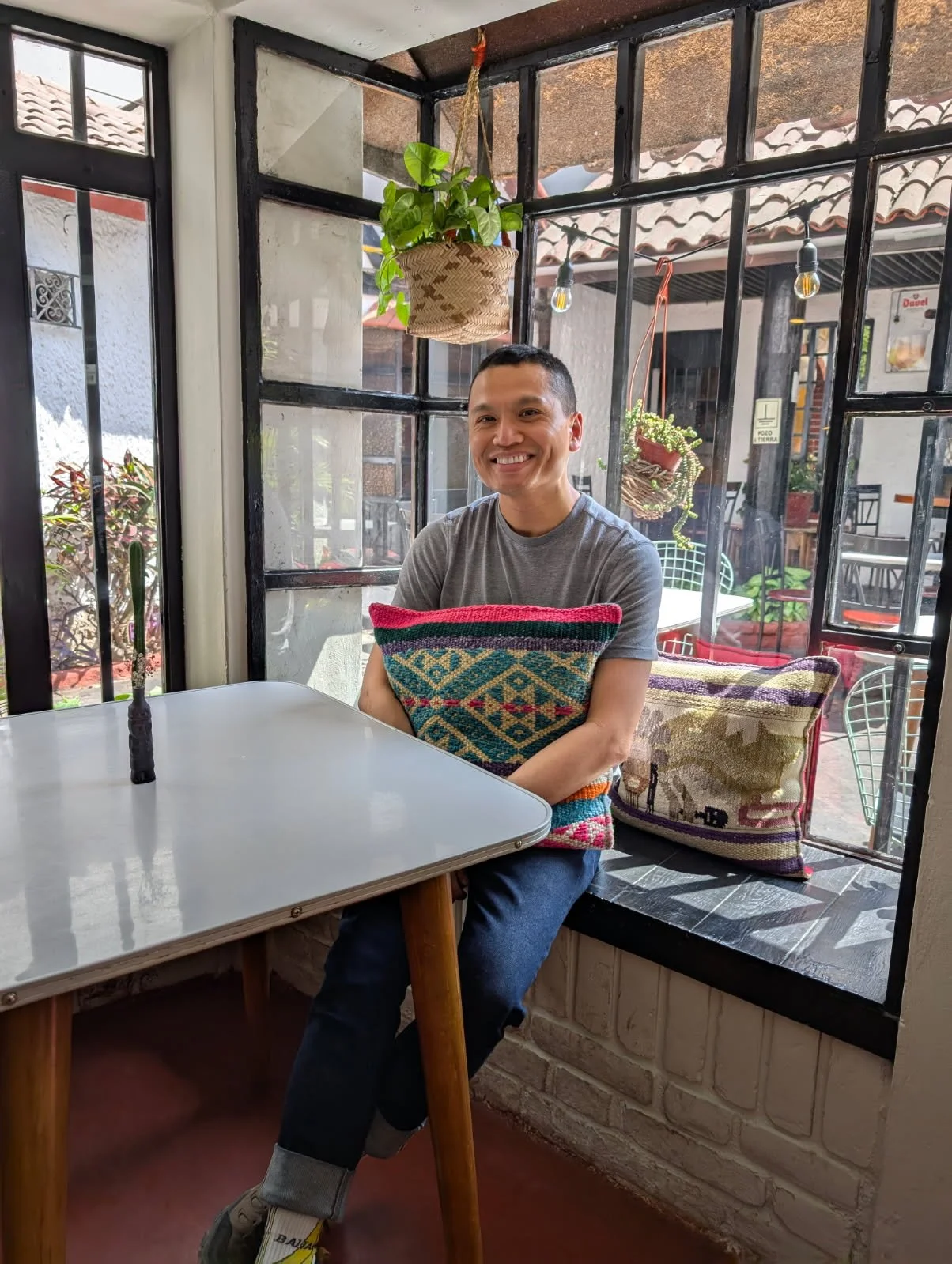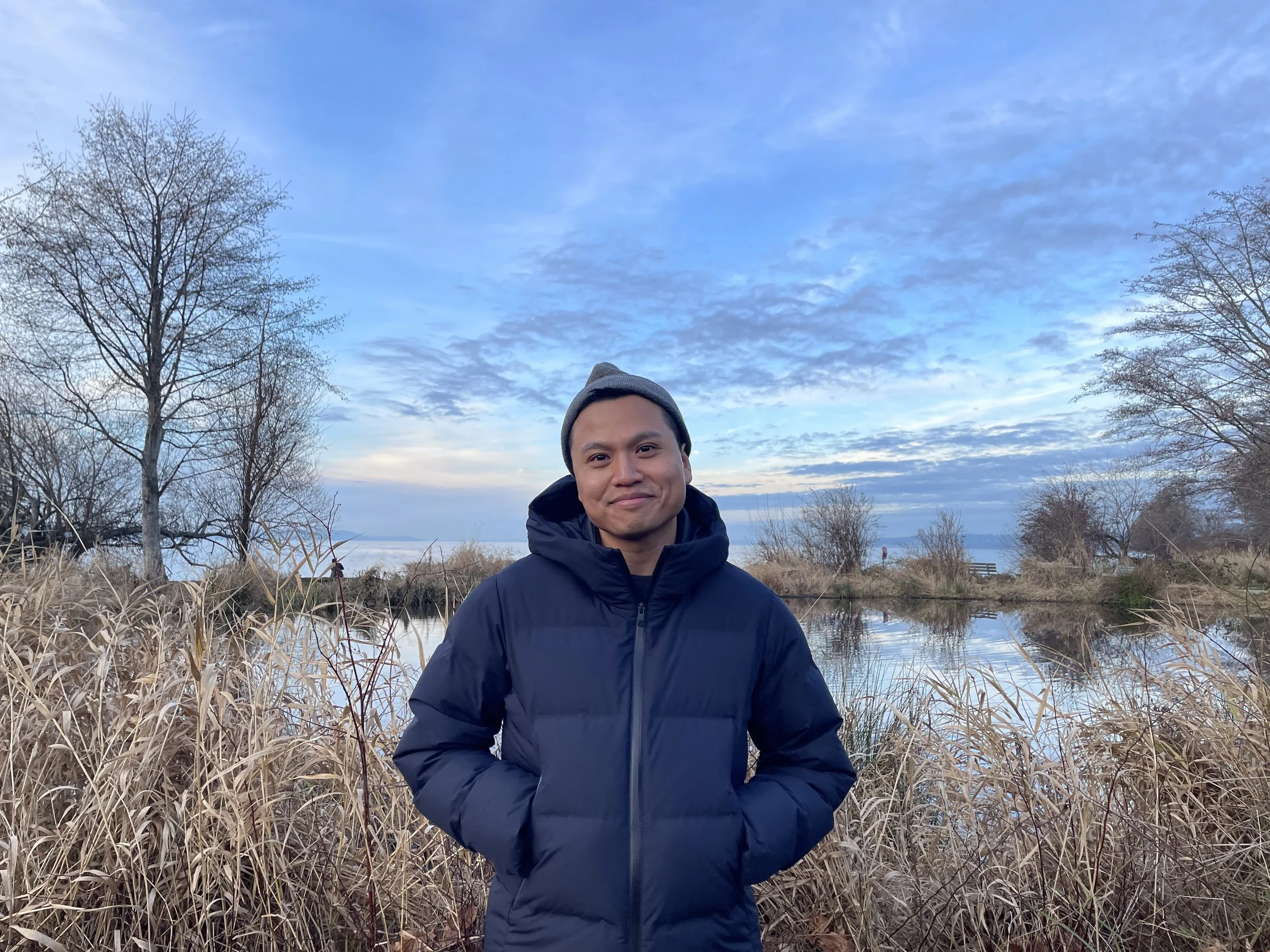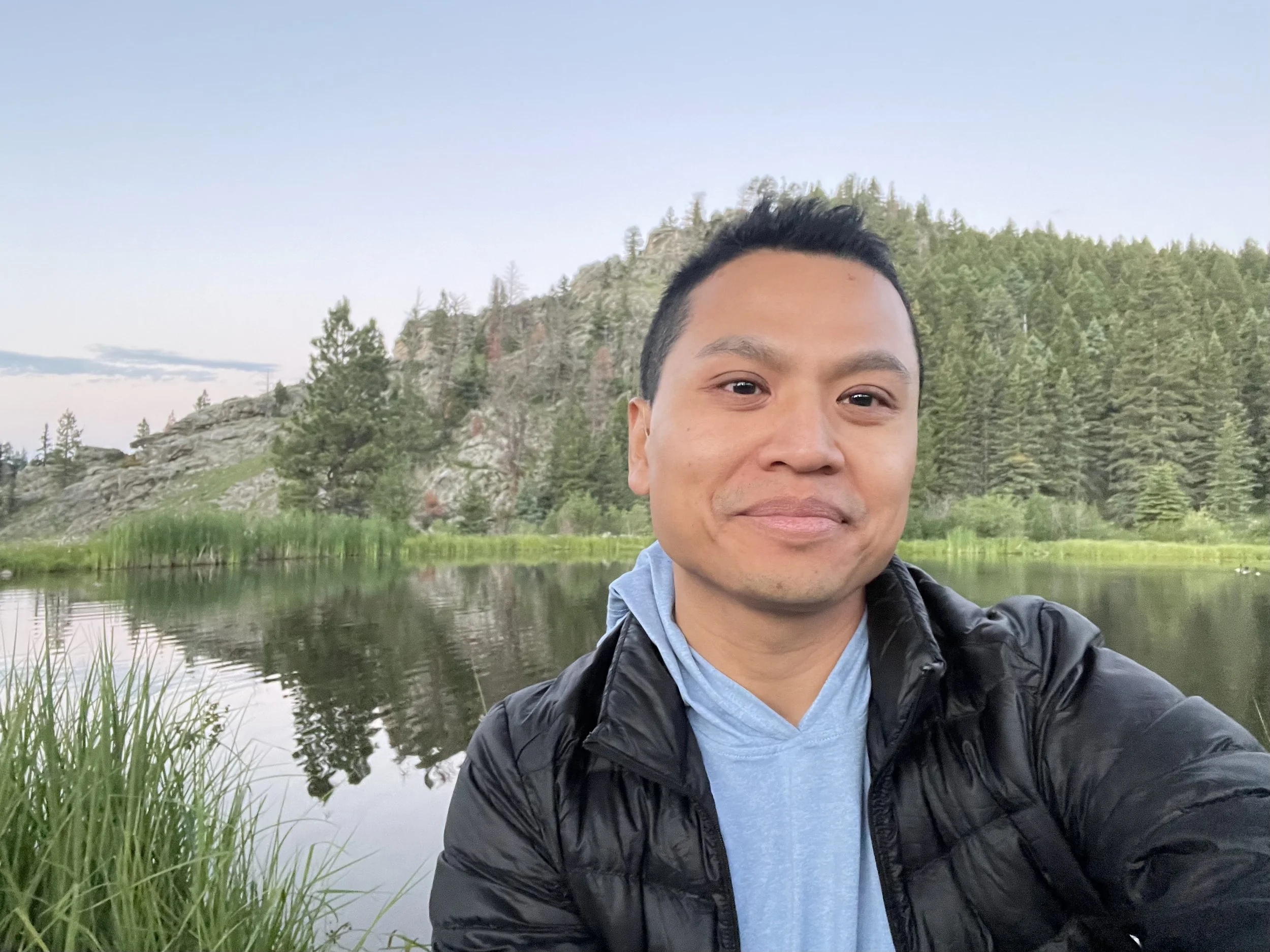Therapist & Clinical Social Worker specializing in trauma, grief, RELATIONSHIPS & MULTICULTURAL therapy
Heal Your Past To Make Peace With Your Present
-
Hi, I’m Canh (he/him).
You’re seeking a direct therapist who will challenge and interrupt you, so you don’t vent the entire session.
You’re seeking an active therapist who will talk with you in session like a real human being. I curse and laugh.
You’re seeking somatic therapy to embody the changes you want because you’ve been living in your head.
Your past wounds are causing you conflict in the present and you want to dive deep into your issues so you can have long lasting and transformational change.
You struggle in intimate relationships, being vulnerable, feeling good enough, with overwhelming emotions and/or negative thoughts, and the exhaustion of overthinking.
You find it easier to take care of others, but at the expense of your own needs and ultimately feel depleted and burned out.
You’re here because you’ve been dealing with the same issues for years, tried solving these problems on your own, and realize you need help.
You’re looking for long term solutions to long term issues.
While there are no quick fixes or solutions for long standing issues, there is hope.
Since 2018, I’ve helped hundreds of individuals and couples impacted by trauma, grief, loss, death, neglect, and chronic stress who yearn for more satisfying relationships with themselves and those they care about.
You hold the answers inside of you to heal and I am merely a facilitator of your journey.
You deserve a good fit therapist. This is not the right fit for all clients, especially those who prefer a more neutral, silent, and/or passive therapist.
I’m deeply invested and committed to your growth and transformation. I ask for equal investment and commitment from you.
I will not ask you to go somewhere I have not gone. I am in my own personal therapy, consultation, supervision, and believe I can only take clients as far as I have gone in my own healing journey.
At my core, my eclectic approach blends:
Trauma informed and trauma specific therapy (understanding of impacts of trauma on human development and functioning using EMDR, IFS, SE, AEDP & EFT)
Parts/IFS work (to help integrate fractured/disconnected aspects of ourselves)
Psychodynamic (impacts of early childhood and cultural upbringing and environment)
Somatic/mind-body connection
Relational therapy (attachment, mentalizing, corrective experiences, repairing after ruptures/conflicts), and
Experiential techniques (e.g. mindfulness, gestalt)
Therapy is not the only way toward healing and growth. There are many ways to heal and therapy is only one way, but certainly not the only way. You get to decide if therapy is a part of your journey or not.
I am not the right fit for all clients.
There are many other types of therapies I do not offer that may be a better fit for what you’re seeking (psychoanalysis, CBT, DBT, etc.).
My goal is for clients to find a good fit therapist, whether that is with me or with someone else, or to learn more about mental health and wellness. That’s why I’ve spent hundreds of hours compiling and creating free resources for the general public.
You can learn more about my approach by clicking here.
-
I love learning.
I regularly attending trainings in the areas of: grief, anxiety, somatic/mind-body therapy, trauma recovery, multicultural therapy, attachment, and relationship issues.
For the first 7 years of my professional career, I spent my time deepening my skills and knowledge in trauma recovery, PTSD, CPTSD, childhood abuse, emotional neglect, and attachment issues.
As of 2024, I am deepening my knowledge in facing our own mortality, death, grief, loss, somatic therapy, and dissociation.
I also regularly attend my own personal therapy, engage in peer and professional clinical consultation, and take time off so clients can receive the best care possible and for me to sustain my work long term due to the occupational hazards of being a therapist.
EDUCATION
University of California, Post-Master’s Fellowship (Counseling & Psychological Services & Social Services)
University of Washington, Master of Social Work (Mental Health Concentration)
University of Washington, Behavioral Health Fellowship
University of Texas, Bachelor of Arts
ADVANCED TRAININGS & EDUCATION
Internal Family Systems (IFS) Levels 1 & 2 & IFIO Basic Trained For Couples/Dyads
Accelerated Experiential Dynamic Psychotherapy (AEDP) Levels 1 & 2
Emotionally Focused Therapy (EFT) Externship For Couples/Dyads & Emotionally Focused Individually Therapy (EFIT) Levels 1 & 2
Psychobiological Approach to Couple Therapy (PACT) Couples/Dyad Therapy Levels 1 & 2
Gottman Couples/Dyad Therapy Level 1
PRATI Ketamine Assisted Psychotherapy (KAP)
MAPS MDMA Therapy Training Program
Eye Movement Desensitization and Reprocessing (EMDR) Basic Trained
Somatic Psychedelic Facilitator Certificate - The Embody Lab
Somatic Experiencing (SE) For Trauma Resolution 3-Year Certificate Program (2nd Year Completed February 2025, 3rd Year Begins January 2026)
Trauma-Informed Care Training Certificate: Working with Female Survivors of Violence
Cognitive Behavior Therapy (CBT)
Acceptance & Commitment Therapy (ACT)
Mindfulness Based Cognitive Therapy (MBCT)
Mindfulness Based Stress Reduction (MBSR)
Psychodynamic Therapy
Fundamentals of Clinical Hypnosis (Level 1)
Level I: The Complexities of Complex Trauma - International Society for the Study of Trauma and Dissociation (ISSTD)
Death Doula/End of Life Education and Planning Training
-
2026 Trainings
WBCP Psychoanalytic Fellowship Program (24 hrs)
Somatic Experiencing for Trauma Resolution - Advanced Level 1 (36 hrs)
The Big Picture: Prolonged Grief Disorder Treatment (PGDT) (6.5 hrs)
Practice-Focused Training in Prolonged Grief Disorder Treatment (PGDT) (14 hrs)
Level I: The Complexities of Complex Trauma - International Society for the Study of Trauma and Dissociation (ISSTD) (30 hrs)
Prolonged Exposure (PE) for Post-Traumatic Stress Disorder (PTSD) (14 hrs)
7-Day Mindfulness and Liberation Meditation Retreat – Foundations of Mindfulness-Based Approaches (21.5 hrs)
Grief /End of Life Training
Meaning-Centered Psychotherapy in Relation to Patient Trauma (1 hr)
Ensuring Palliative Care For All: Optimizing Access for LGBTQ People (1 hr)
LGBT-Inclusive Hospice & Palliative Care (1 hr)
Faith In terms of Death & Dying (1 hr)
Understanding Depression in Palliative Care (1 hr)
Depression & Anxiety In The Seriously Ill (1 hr)
End-Of-Life Through A Cultural Lens: Lessons Learned & Best Practice Suggestions (1 hr)
Embracing Cultural Humility In End-Of-Life Care (1 hr)
Bereavement: Unmasking & Expressing The Contributing Factors That Affect How One Grieves (1 hr)
Anticipatory Mourning At End-Of-Life (1 hr)
Understanding Anxiety In Palliative Care (1 hr)
Culturally Competent Approach to Hospice, Palliative Care, And End-Of-Life Care For the LGBTQ Population (1 hr)
Treating Traumatic Grief (1 hr)
Understanding and Treating Grief and Diverse Losses (1 hr)
Reclaiming the Holidays: Coping with Grief and Trauma (1 hr)
2025
Death Doula/End of Life Education and Planning Training (40 hrs)
Eye Movement Desensitization and Reprocessing (EMDR) (50 hrs)
Fundamentals of Clinical Hypnosis (Level 1) (25 hrs)
Somatic Experiencing for Trauma Resolution - Intermediate Levels 1, 2 & 3 (72 hrs)
The Psychotherapy Institute - An Intensive Short Term Dynamic Psychotherapy (ISTDP) Weekly Study Circe (48 hrs)
Grief /End of Life Training
Exploring the Complexities of Grief (2 hrs)
Intro to Perinatal Loss: The Presence of an Absence (2 hrs)
Perinatal Loss and Prolonged Grief Treatment (1 hr)
Immigration: Trauma & Grief (1 hr)
Loss, Grief, and Domestic Violence: The Power of Transformation (2.5 hrs)
Loss of Autonomy: Working With Differently-Abled Individuals (1.5 hrs)
Nutrition and Hydration Near the End of Life (1 hr)
Advanced Cancer and End of Life (1 hr)
Perspectives on Cultural Considerations in Goals-of-Care Conversations (2 hrs)
Embrace, Engage, Empower: Cultural Awareness in End-of-Life (1 hr)
Advanced Lung Disease: Prognostication and Role of Hospice (1 hr)
Veterans Nearing the End of Life: Distinct Needs, Specialized Care (1 hr)
Trauma and Dissociation/CPTSD Informed Internal Family Systems (IFS) - A 5-Day IFS Retreat With Joanne Twombly (32 hrs)
Cognitive Behavior Therapy for Suicide Prevention (CBT-SP) (14 hrs)
Narrative Therapy Training (12 hrs)
Unified Protocol for the Transdiagnostic Treatment of Emotional Disorders (6 hrs)
2024
Internal Family Systems (IFS) Level 2, Deepening & Expanding (42 hrs)
Intimacy from the Inside Out (IFIO) Basic Training For Couples/Dyad Therapy (72 hrs)
Somatic Experiencing for Trauma Resolution - Beginner Levels 1, 2 & 3 (72 hrs)
Internal Family Systems (IFS) Workshop - Shame & Guilt (2 hrs)
Internal Family Systems (IFS) Workshop - Chronic Pain (2 hrs)
Somatic Psychedelic Facilitator Certificate - The Embody Lab (32 hrs)
Psychedelic Education Certificate (MDMA, Psilocybin, Ketamine, and 5-MeO-DMT) - Psychedelic Support (20 hrs)
Trauma-Informed Care Training Certificate: Working with Female Survivors of Violence (40 hrs)
7-Day Silent Retreat: Befriending Mortality: Living An Awakened Life Through Mindfulness of Death
Cultivating Focused Attention: An Intensive 7- Day Mindfulness Retreat for Mental Health Professionals
7- Day Silent Meditation Mettā Retreat: Teachings and Practices to Cultivate a Wise, Compassionate, and Responsive Heart
Mentalizing and Mentalization-Based Treatment with Adults (MBT Adult): An Introduction (6 hrs)
General Psychiatric Management (GPM) for Borderline Personality Disorder (BPD) (6 hrs)
Clinical Supervision Training: (Almost) Everything You Need to Know (18 hrs)
2023
Internal Family Systems (IFS) Level 1 (72 hrs)
PRATI Foundational Ketamine Assisted Psychotherapy (KAP) Training (30 hrs)
MAPS (Now Lykos) MDMA Assisted Therapy Training (30 hrs)
Cognitive Processing Therapy (CPT) for Posttraumatic Stress Disorder (PTSD) (14 hrs)
Introduction to Military Culture, Families and Deployment (6 hrs)
Overview of Military Service-Related Behavioral Health Challenges (7 hrs)
2022
Psychobiological Approach to Couples/Dyad Therapy (PACT) Level 1 (30 hrs)
Psychobiological Approach to Couples/Dyad Therapy (PACT) Level 2 (30 hrs)
Transforming Resistance - Yearlong Seminar in Intensive Short Term Dynamic Psychotherapy (ISTDP) (18 hrs)
Mental Health Suicide in 2022: An Update for Professionals (6 hrs)
Socratic Dialogue: A 4-Stage Model of Discovery (1 hr)
2-Day Certified Clinical Trauma Professional Training - PESI (12.5 hrs)
In Depth Trauma Training (27.5 hrs)
Healing from Childhood Trauma (3 hrs)
Trauma and Couples Therapy: Treading through Contentious Waters (3.5 hrs)
Trauma Informed Care (3 hrs)
The Neurobiology of Trauma (1.5 hrs)
How Deep Does Pain Go?: The Impact of Violence Across
One's Lifespan (4 hrs)
The Elephant in the Room: Interventions to Treat Trauma (3 hrs)
Joy and Sorrow in the Same Cup: Addressing Grief, Loss & Trauma in Adoption (1.5 hrs)
Trauma Informed Responses to Sexual Violence (1.5 hrs)
Life After Death: Overcoming Childhood Trauma (1.5 hrs)
The Impact of Childhood Trauma Across the Lifespan (3 hrs)
Exploring the Complexities of Grief (2 hrs)
2021
Accelerated Experiential Dynamic Psychotherapy (AEDP) Level 2, Essential Skills (80 hrs)
Emotionally Focused Individual Therapy (EFIT) Levels 1 & 2 (24 hrs)
Mindfulness-Based Cognitive Therapy (MBCT) (12 hrs)
Seeking Safety Training (Substance Use & PTSD) (6 hrs)
Dialectical Behavior Therapy Skills: Introduction (12 hrs)
Community Resiliency Model (CRM) (6 hrs)
Attachment Injury Resolution Model (AIRM) (12 hrs)
NICABM - The Treating Trauma Master Series: A 5-Module Series on the Treatment of Trauma (10 hrs)
2020
Emotionally Focused Therapy (EFT) Externship (28 hrs)
Mindfulness Based Stress Reduction (27 hrs)
All Patients Safe: Suicide Prevention for Medical Providers (6 hrs)
2019
Accelerated Experiential Dynamic Psychotherapy (AEDP) Level 1 Immersion (30 hrs)
Trauma Informed Care & Practical Approaches To Managing Trauma Responses In Eating Disorder Treatment (12 hrs)
Mindful Self-Compassion Core Skills Training (22 hrs)
Acceptance & Commitment Therapy (ACT) Boot Camp/Immersion (32 hrs)
2018
Motivational Interviewing Skills (MI) Training (12 hrs)
Gottman Couples/Dyad Therapy Level 1 (12 hrs)
Common Elements Treatment Approach (CETA) (14 hrs)
Assessing and Managing Suicide Risk: Core Competencies for Mental Health Professionals (6 hrs)
Essentials of Cognitive Behavior Therapy (CBT) (5 hrs)
-
WE MIGHT BE A GOOD FIT IF YOU VALUE:
01. Being Challenged & Interrupted At TImes
Rather than venting every session and have me nod in silence
I believe there is a limit to how much endless validation can help you grow
Most of the clients I see provide me feedback that their previous therapist did not provide them structure and education on therapy, and instead just allowed them to vent without guidance.
Therapy with me is a deliberate process where we will address what you’ve been avoiding gradually. I will provide you ample education and rationale for why we are doing what we are doing, so you don’t feel lost.
02. Are Active In Therapy
Come in with things to talk about, practice skills/tools outside session, open to trying new things.
Therapy works best if the client is motivated, open, and engaged to used the session to confront their challenges so they can grow.
Change is rarely comfortable and pleasant. It is my job to support you with compassion, empathy, and professionalism.
Research shows about 40% of the change from therapy occurs outside of session, is due to client related factors (e.g. personality, motivation), and other systemic and contextual factors (e.g. time, money, home life, support).
Forcing yourself or being forced to attend therapy rarely yields positive results. It’s your decision to decide if therapy will be a helpful tool for you.
03. Direct Communication & Soliciting Feedback
Therapy is most helpful when you communicate with me your disagreements, your requests/wants, and when you give me feedback on what is and isn’t helpful. I’ll do the same.
This is why many clients “ghost” their therapist when there is a disagreement, rupture, or conflict and they end up feeling misunderstood, hurt, or invalidated.
Or at worst, this is why sometimes clients stay in therapy that is ineffective for them longer than they need to due to fear, anxiety, or worries of some sort and wish their therapist could read their mind and address the implicit issues in the room haunting the therapy session.
If you struggle with assertive communication and want to learn this, I can help you.
04. Dialectic or Balance
I try to balance things in therapy:
Balancing validation with challenge
Balancing insight with learning skills
Balancing listening with interrupting
Balancing acceptance with change
Life is a dialectic. Both things and multiple things can be true at the same time.
05. Other Methods Outside of Talk Therapy
Such as mindfulness, experiential therapy, psychodrama, somatic therapy
There is a limit to how beneficial talk therapy can be, especially you are an intellectualizer who values logic, data, theories, and cognizing over emotions, sensations, and experiences
As Steven Hayes states, “Get out of your head and into your body”.
05. The Healing Power of Relationships
We will use our therapeutic relationship as a template for learning new healthy experiences and opportunities for repair and growth
The relationship patterns you struggle with outside of therapy will inevitably show up in our sessions, between me and you.
These challenges give us insight into why you struggle as well as what you need to change and grow into the sort of person you want to be toward meeting your therapeutic goals. We will interrupt these patterns with new experiences and patterns.
Example: If you are a people pleaser, you will most likely use people pleasing strategies in therapy which will get in the way of therapeutic progress. Intervention: People please less and have the option to utilizing assertive communication (vs. passive, passive aggressive, or aggressive communication styles) so you can ask for what you want without guilt.
Example: If you fear conflict, you will most likely try to avoid conflict in therapy, which is impossible because conflicts are a normal part of any relationship. Intervention: Understand the root of why you fear and avoid conflict. Normalize conflict by learning healthy communication, healthy relationships, communication skills, and accessing your emotions and sensations.
Example: If you struggle with feeling, naming, and being aware of your emotions, you will most likely struggle with accessing your emotions in therapy. Emotions are important and provide us data, like thoughts. Intervention: Understand the strategies for why you struggle with accessing your emotions. Slowly build the capacity to feel, name, and express your emotions so you can have a more meaningful life based on connection vs. disconnection.
06. Want to Learn How to Become Your Own Therapist Long Term
My goal is for you to gain insight and understanding into why you do what you do, interrupt unhelpful cycles of sabotage, and learn skills/tools to manage future conflicts
WE MIGHT NOT BE A GOOD FIT IF YOU:
01. Expect Perfection
I’m not perfect, will make mistakes, and will communicate directly when this occurs toward resolution
02. Expect Me To Do All The Work
Examples: Solve your problems, tell you what to do, consistently have to ask you what you want to work on in session, am more curious about you than you are of yourself
03. Cancel Sessions Often
Therapy works best with consistency
04. Don’t Take Accountability
Confronting our shadows require honesty about our humanity and limitations
05. Don’t Liked Being Challenged
Of course, I will be gentle and compassionate, but in my experienee, endless validation is not going to be helpful long term
06. Demand Instant Change Within 3-4 Sessions
While relief can come in a few sessions, long term change requires compassion, practice, patience, and repetition
07. Want to Get Rid of All Your Feelings & Thoughts
Pain is inevitable in life
My goal is for you to learn to accept and manage life stressors, pain, and grief with more compassion, nuance, and acceptance.
If we get rid of painful feelings and thoughts, we also then will have a difficult time accessing joy, love, and peace. What we resist persists.
Moreover, there are things in life that cannot be forgotten, forgiven, or rid of such as the loss of a loved one or traumatic experiences
08. Aren’t Interested in Exploring Your Past, Childhood, or Upbringing
There are other therapists who focus only on the present moment with an emphasis on skill building and generating quick solutions that may be a better fit (CBT, DBT, ACT)
-
I specialize in 3 areas: 1) Childhood Trauma & Neglect/Adults Abused & Neglected as Children, 2) Grief & Loss, 3) Relationship/Attachment issues, and 4) Children of Immigrants & Refugees (Bicultural Identity)
I am especially interested in how these 3 areas intersect.
Joy & Liberation
Childhood Trauma/Adults Abused & Neglected as Children
Adult Children of Alcoholics & Dysfunctional Families
Adults Raised By Emotionally Immature Parents
Generational Patterns
Chronic Stress
Couples/Dyad Therapy
Infidelity & Betrayal
Communication Issues
Grief & Loss
Intimacy
Multicultural Issues
Attachment Styles
Fear of Intimacy & Commitment
Emotional Unavailability
Mistrust & Trust Issues
Self Sabotage & Destructive Behaviors
Fear of Abandonment
Difficulty With Criticism & Rejection
Self Esteem
Grief, Loss & Death
Befriending our Mortality
Physical Death
Loss of Safety & Security
Loss of Ability
Loss of Health
Loss of Identity
Death Anxiety
Anxiety & Panic
Racial Identity
Internalized Racism
Belonging & Community
Impostor Syndrome
Southeast Asian Immigrants & Refugee Diasporas
Children of Immigrants
1st, 1.5 and 2nd Generation Immigrants
Cultural Double Bind
Perfectionism
Model Minority Myth
Acculturation
Cultural Brokers/Translaters
Generational Trauma
Gay/Queer Men & Men’s Issues
Emotional Intelligence
Socialization, Pressures & Expectations
Minority Stress
Anger
Shame & Guilt
Belonging & Community
Somatic/Mind-Body Healing
-
Clients who work best with me often seek a trauma, relationship, anxiety, and/or grief specialist.
I work with…
Couples/dyads who want to learn assertive communication skills, fight more effectively, and rebuild more intimacy and trust in their relationship
Chronic over thinkers who intellectualize their problems, are self-aware to a fault, and find it hard to connect to their feelings
Those in the midst of a major life transition (becoming a parent, empty nest syndrome, divorce, separation, starting school, changing jobs, new diagnosis, recent loss, etc.)
Men who want to become more aware of their emotional world, increase comfort with vulnerability, and learn to ask for what they want in healthier ways
Those who want to explore their own mortality, discuss the practicality and emotionality around their own death, anxiety/fear of death, and continually mourn their losses and grief
Healthcare professionals, therapists, and social workers who are wounded healers
Those who are exhausted, overwhelmed, burnt out, experiencing compassion fatigue, and want to take better care of themselves
Adults abused as children, emotional neglect, sexual violence/assault, attachment/developmental trauma, and those who grew up in dysfunctional families
Survivors of trauma who are parents who want to parent healthier children and break the cycle of trauma
Immigrants and children of immigrants who want to break unhelpful generational patterns, and break free from guilt
Queer/gay people who want to learn to love themselves unconditionally, feel more at home in their bodies, and unlearn harmful messaging from family, society, and our larger culture
Those seeking exploration of their intersectional identities, processing existential issues, and finding more meaning and value in life
-
I want to…
Interrupt patterns of self sabotage.
Understand why I do what I do.
Heal from the impacts of trauma, grief, and loss.
Learn how to manage my traumatic triggers and flashbacks.
Learn how to manage stress, anxiety, panic, and overwhelm.
Learn how to be kinder to myself and practice self compassion.
Become more aware, name, express, and feel my emotions.
Learn how to manage overwhelming thoughts and emotions.
Have a more intimate, strong, and robust relationship with myself and others.
Have a space for myself because I usually internalize my thoughts and feelings.
Become more comfortable with vulnerability.
Learn to ask for what I need and when I need help.
Learn direct and assertive communication.
Learn healthy and flexible boundaries.
Work through feelings of shame and guilt.
Increase my sense of Self (confidence, esteem, acceptance, love, compassion).
Find more meaning and value in my life.
Have an outside perspective to my issues.
WHY PEOPLE LIKE WORKING WITH ME
01. Authentic & Honest
Healing requires being real and direct. I’m not a robotic, neutral therapist who sits in silence.
I bring my personality, genuineness, and sense of humor into sessions. Sometimes, I laugh and curse.
Expect me to be professional, straightforward, kind, and compassionate.
02. Challenging & Supportive
You want someone who will ask you the hard questions, challenges you, and offers feedback.
Change often happens at the intersection of discomfort, patience, and repetition.
Please be open to feedback and change if you want your life to be different. I’ll also be open to learning, flexible, and adaptive.
03.Focus On Long Term Change
We’ll get to the root of your issues so you can feel relief, freedom, and peace, not just stay on the surface level.
You’ll increase self-understanding, acquire practical skills, and reconnect to your true self so you can stop self sabotaging patterns.
My goal is for clients to work me out of a job and stop seeing me.
-
A therapist’s years of experience, type of therapist (social worker, psychologist, mental health counselor, etc.) and the type of therapy they practice (CBT, DBT, etc.) matters less than the quality of the relationship you have with your therapist.
Research shows that one of the largest factors for therapeutic success and effectiveness is the relationship between you and your therapist.
Other factors include:
Hope
The client
The therapist
Treatment type/model
Routine feedback/measurement
Attention to diversity.
Read more here.
You should find a therapist you like, find comfortable talking with, and who also has adequate training for your specific issues.
-
My biggest teachers have been in relationships and this is where I learned to grieve, stumble, fall, fail, grow, laugh, celebrate, and thrive.
I am grateful for supervisors, teachers, mentors, femtors, authors, speakers, modalities, trainings, and experiences that have guided me on my professional and professional journey, whether or not I have physically met them.
Authors
Maureen Walker
Toni Morrison
James Baldwin
Ocean Vuong
Therapists & Healers
Ignacio Martín-Baró
Alice Miller
Thích Nhất Hạnh
BJ Miller
Francis Weller
Jacob Ham
Esther Perel
Virginia Satir
Travis Heath
Clarissa Pinkola Estés
Supervisors
Kin Ming Chan
Tobirus Newby
Alice Cagampang Ryan
Colleagues
Helen Youngju Kim
Menosh Z.
Georgina Mendoza
Nabilah Khan
Giovanna Torres
Modalities
Dialectical Behavior Therapy (DBT)
Somatic Therapy & The Mind-Body Connection
Buddhist Meditation
Intensive Short Term Dynamic Psychotherapy (ISTDP)
Mentalization Based Therapy (MBT)
Object Relations & Attachment Theory
Relational Psychoanalytic Theory & Psychodynamic Therapy
I Have More Questions
-
Of course.
Some people never go to therapy and live full and complete lives.
While it's possible to work on your own personal healing, therapy offers different benefits that may be difficult to achieve on your own.
Talking to a friend, reading books, journaling, mindfulness, meditation, exercise, yoga, smart phone apps, chat GPT, and scrolling through TikTok and Instagram are all tools.
Therapy is another tool.
Therapists provide:
Accountability
Support
A professional perspective
Structure
Confidentiality
Expertise, skills, and training
Forcing yourself or being forced to attend therapy rarely yields positive results.
It’s your decision to decide if therapy will be a helpful tool for you.
-
Yes, but it depends.
Research shows about 15 to 20 sessions are required for 50 percent of patients to recover as indicated by self-reported symptom measures.
Therapy Is More Helpful When:
There is a good relationship between client and therapist (personality, temperament, style, approach, feeling understood and validated)
Adequate education, training, and skill needed to treat the concerns
Regular feedback/measurement toward progress
A treatment plan/road map provided
Understanding about what therapy is and is not (expectations, boundaries)
Hope the therapist can help
Hope therapy will be useful/effective
Treatment model/approach/style matches what client concerns need (e.g. you want a therapist who is active, direct, and talks with you vs. someone who nods at you in silence)
Respect for diversity and difference are addressed
The client:
Has goals and what they want to work on
Practices skills/learnings outside of sessions
Brings up positive and negative feedback to the therapist
Comes to session consistently on time
Is open to trying new things and ways of relating and thinking
Read more here, here, and here.
For some people, at best, therapy is ineffective.
At worst, therapy is harmful and contributes more to stressors and an increase in negative symptoms.
This is why it’s important to do your own research, learn about different therapy models, try therapy out for 1-3 sessions, and determine if it’s a good fit for your needs or if you require something else (e.g. coaching, support group, medication, etc.) or a different type of therapy (e.g. equine therapy, expressive arts therapy, sandtray therapy, somatic therapy, etc.).
A list of therapeutic modalities/approaches:
-
To be a professional (follow ethics, confidentiality, respecting your choices/preferences, treat you with respect and kindness, be direct in my communication)
To be open to feedback and suggestions
To be prompt and on time to session
Honest if I can or cannot help you at anytime and provide a referral to another therapist (e.g. if your symptoms don’t get better, if I learn I do not specialize in an area/issue you bring up)
Honest if I notice repeated unhelpful patterns and dynamics occurring and to directly communicate this with you
Predictability and consistency (sessions at scheduled time, notice when I take time off, providing a backup therapist referral should I be gone for longer than a few weeks)
Flexible in my approach (if something doesn’t work for you, I will adjust as needed)
To provide you with a treatment plan or roadmap of what to expect during our work together
To let you know when I think it is best to stop therapy if you have met your goals, plateaued with me, if I’ve lost objectivity, you’re being harmed in our work, or not getting better in our work
-
Consider if therapy is the right approach for what you’re seeking vs. other alternatives (coaching, support groups, courses, workshops, retreats, etc.)
Consider if you have the time, money, energy, and effort to invest in and outside of session at this moment in your life
Establish achievable goals and expectations
Consider maximum monthly therapy expenses or if you want to use insurance
Solicit feedback: Be honest about what is helpful, isn’t helpful, and tell your therapist
Come into session with topics you want to talk about/explore
Patience: It may take multiple sessions to feel progress
Compassion: Kindness, not shaming and criticism, helps with fostering long-term growth and change
Carve out time before therapy to prepare and after to take care of yourself gently and slowly and to transition to your next activity with more ease.
Identify what’s most important to you in a therapist (e.g. style, age, personality, cultural background, values, training, fees, insurance)
Ask for clarification and comprehension if you are unsure what your therapist is discussing or bringing up.
Not every therapist will be a good fit. There are many types of therapists with different personalities, approaches, cultural backgrounds, etc. Find someone with whom you feel comfortable talking openly.
For example, if you’re seekng a solution-focused type of therapy, you can consider CBT or Brief Solution Focused Therapy.
If you’re seeking trauma-focused therapy, you can consider PE, CPT, EMDR, IFS, etc.
If you want a more passive therapist who will let you talk without interruption, you can consider person-centered therapy, humanistic therapy, psychodynamic therapy, psychoanalytic therapy.
-
Signs you're progressing in therapy can include but is not limited to:
Gaining insight: learning why you do what you do
You learn skills and tools to manage overwhelming situations and life stressors
You can cope and manage stressors using helpful strategies and rely less on unhelpful survival strategies
Your initial symptoms have decreased
Your mood has improved
You have more flexible ways of thinking
You feel more confident to handle things on your own
You try things outside of therapy and are more able to experiment and take risks you usually avoid
You feel more empowered
And more
Your therapist should have a treatment plan for you.
A treatment plan is an overview of your issues, concerns, goals, and what evidence based interventions and treatment types will help you work toward your goals. This is often completed in the early stages of therapy.
Reviewing your treatment plan periodically can help you see if you've made progress in therapy, as well as identifying barriers toward achieving your goals.
-
To be prompt and on time to session
To come to session with a general idea of things/concerns/issues you want to discuss/explore/dive into
To be open to trying new ways of thinking and being
To be honest and direct about your needs/wants
To solicit feedback when things aren’t working
To honor the therapeutic boundaries
To do the work outside of session (practice, practice)
To practice patience and acceptance
To tolerate the hard work of confronting uncomfortable and painful experiences (healing is rarely easy and fun)
To let me know when you think you want to stop or pause therapy, or need another type of therapist/therapy style
-
It’s common to feel nervous and stressed about going to therapy, especially if you’ve never gone before.
Human beings are hardwired to avoid pain, discomfort, and the unknown.
Common reasons clients feel unsure about therapy:
Feelings of embarrassment
Discomfort with vulnerability
Stigma around mental health due to cultural norms
Expenses/fees
Fear of being misunderstood
Fear that treatment will not be helpful
Commitment to treatment long term
Past negative experiences with therapists
And more
I’ll ask you questions about your worries so we can alleviate and address your concerns.
There is no “perfect” time to start therapy. We begin where you are at and we move slowly. The hardest part is usually making the first step and reaching out.
Trust times take time to build. We’ll only continue meeting if we both find it helpful and a good fit.
If I’m not a good fit for your needs, there are a variety of therapies and types of therapies available who can help you.
As a therapist who goes to therapy, I still feel nervous at times going to therapy!
-
Feeling stuck could be a sign of many things including:
Plateauing in therapy
Avoidance such as repeatedly cancelling or arriving late to sessions
New stressors and new goals to work on
Feeling worse after sessions
Not making progress toward goals despite consistent effort
Unrealistic expectations of therapy and your therapist
Needing a new type of therapy or therapist that your current therapist does not offer, and
Many more reasons.
If you feel stuck, talking directly to your therapist can be helpful as feeling stuck is different for everyone.
While uncomfortable for many clients, having an open and direct conversation with your therapist can be useful because:
Your therapist can adjust their treatment approach
Review and modify your treatment plan if needed
Provide you psychoeducation on what could be occurring as you feel stuck
Discuss if another type of therapy or treatment type is needed they are not adequately trained in, and
Many more reasons
-
I do not have adequate specialized training & experience with the following populations and issues:
Children
Adolescents
Teens
Families
Psychosis
Sleep issues/insomnia
Mandated/court ordered therapy
Disability evaluations
Forensic evaluations
OCD
Discernment counseling
Sex therapy
No Crisis Services
I can’t take on clients who are actively suicidal and homicidal, active eating disorders, active addiction, and/or problematic substance use due to being a one person practice.
These issues require a higher level of care where you are provided intensive care (e.g. more than an hour once a week).
-
Fall & Winter Hours (October- February)
Monday – Wednesday
8:00 a.m. – 5:00 p.m.Thursday
1:00 p.m. – 4:00 p.m.Spring & Summer Hours (March- September)
Monday – Wednesday
8:00 a.m. – 7:00 p.m.Thursday
1:00 p.m. – 6:00 p.m.In Person Sessions On Mondays & Tuesdays
Virtual Sessions Mondays - Thursdays
-
-
Read my Frequently Asked Questions here.
















